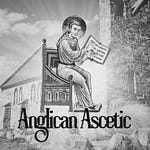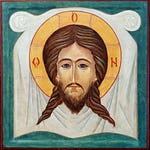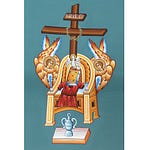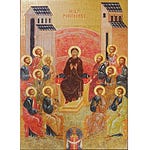There can be no question that Saint Paul the Apostle is among the group of Saints whose life and intercession for us is most fundamental to Christian life. Alive in Christ’s resurrection along with the all the company of heaven, Saint Paul’s witness and martyrdom—which are two words that say the same thing, because the word “martyr” means in Greek “witness”—is a perpetual image of what it means to be a disciple of Christ, of following Our Jesus’ teaching to be sent out as sheep in the midst of wolves, wise as serpents and innocent as doves. His writings are inexhaustible, the significance of his life for us is inexhaustible, and of course being a Saint in heaven, in the Church Triumphant, his daily intercession and prayer for us and on our behalf is inexhaustible. Paul prays for us daily that we would know Christ, and be known by Him.
To be a Saint means that one’s whole existence is full of the Holy Spirit and resonates or mediates the Holy Spirit to others. To be a Saint is to be so taken up into Christ that all one’s words and deeds—everything about them—is Christ and leads others to Christ. As I have said, it is not theologians or clergy who are the most reliable interpreters of scripture, but rather the Saints: because their lives live-out the Gospel, and the Spirit Who proceeds from the Father speaks through them.
In the Collect for our Liturgy today we ask God that we, having Paul’s wonderful conversion in remembrance, may show forth our thankfulness unto God for his conversion by following the holy doctrine he taught. And if we set out to consider all the holy doctrine he taught, we would have a long list indeed. The familiar doctrine of being a reasonable, holy, and living sacrifice unto God comes from Paul and is derived from his doctrine of the Cross. He is known as well for doctrine about the Sacraments especially Baptism and Eucharist (the first eucharistic doctrine traces from Paul’s epistle to the Corinthians), for justification, predestination, and others. From Paul we even what might be called “doctrine of the parish,” of what it means theologically to be a parish (not merely a community but a godly organism in Christ), and what being part of a parish demands of us. And Paul is the articulator of yet more holy doctrine I have not mentioned. He is a mystical teacher of glory beyond words, after all.
It was in reflecting upon the speech captured by Saint Luke that Paul made to King Agrippa that I was struck by yet another doctrine taught by Paul, although not taught through his words themselves but implicitly in his speech as well as Paul’s overall life. It is his doctrine of holy Scripture (meaning the Old Testament). We hear Paul say to the king, “I myself was convinced that I ought to do many things in opposing the name of Jesus of Nazareth.” What convinced him before his conversion was the interpretation of Scripture that he had come to have and live-out through the education he received from the rabbi Gamaliel according to the strict manner of the law of his fathers, being, Paul also tells us, himself extremely zealous for the tradition of his fathers.
According to the interpretation of Scripture that he had, in looking upon the man Jesus of Nazareth, Paul saw not savior but blasphemer. According to his scriptural interpretation of what is commonly called the Old Testament, in Jesus Paul saw not Son of God but Son of Satan. And because of this, Paul not only shut up many of the saints (that is, shut up many of the baptized Christians) in prison, but when they were put to death Paul cast his vote against them. He had a raging fury against Christians, and he persecuted them even in foreign cities. He was infamous for this, and feared by all Christians.
It was having set out to do so in the foreign city of Damascus that the direction of Paul’s life changed. Like the Magi who after their encounter with Jesus Christ through Mary His Mother set out for home by a different direction than by which they came—the direction of Paul’s life was permanently altered when he encountered Christ on the road to Damascus. Christ shown through a bright light from heaven, brighter than the sun because Christ is the icon of the invisible God, and He spoke to Paul the words, “Saul, Saul, why do you persecute me?” Speaking to Paul was Christ Crucified and Resurrected, persecuted by Saul and so we might reasonably picture the encounter as Christ speaking to Paul from His Cross, still nailed to the Cross upon which Christ was persecuted.
And it was from this moment that Paul’s whole interpretation of Scripture began to change, although the transformation took three years to begin to fully mature. Before the change, Jesus was just a man, Paul was not fallen through original sin, and a great many of the words of the Prophets—Isaiah, Jeremiah, Ezekiel and the rest—had holes of incomprehensibilty, because the person to whom the words applied was unknown and not revealed. But now, through Paul’s conversation, with the eyes of his heart enlightened, the truth of Scripture broke open like never before, because the person to Whom the words applied was now revealed. The Scriptures now opened, and soon the bread broken, everything central to the interpretation of Scripture is changed. Jesus is a man, sure; but with the eyes of scriptural faith even more so He is the image of the invisible God, the Eternal Word of the Father. Jesus is Lord of all. And even more: in a wonder to him and all the apostles of the early Church, the strange and confusing words of the prophets become clear windows to heaven, for the prophets describe Christ and His presence among the prophets and among us, starting with the words of Isaiah 7:14: “the Lord himself will give you a sign. Behold, a virgin shall conceive and bear a son, and shall call his name Immanuel.” These words were a useless mystery to Jewish rabbis, but with the scriptures opened and the bread broken, these words perfectly speak of Christ—and show that Christ Himself was present to Isaiah, and always present to us as we pray upon this verse at Christmas with our eyes of faith.
Christ changed Paul’s self-understanding. Now Paul himself is not only fallen from sin, but all his flesh is corrupt and disordered except insofar as Christ lives in him. According to the old interpretation, Paul could not live with himself without the death of Christ’s followers; now, with eyes of scriptural faith, he cannot live at all without being incorporated into Christ’s body along with the rest of His followers. And this is the power of Jesus Christ in our lives: we can think of ourselves differently than if we did not have the Gospel. We are God’s chosen, foreknown and predestined by God for a life of mercy in the Holy Spirit Who works through us upon the world. We can no longer live to gratify ourselves, but to please God. What gift!
And so may we always seek to follow the holy doctrine taught by this great Saint, our patron, and to celebrate it. For to celebrate the doctrine of Paul is to celebrate the Gospel of Jesus Christ. It is through the Cross that the Scriptures are opened. It is through the Cross that the bread is broken. Let us glory in what Paul gloried in, and all the Church: it is in the Scriptures that we find Christ. It is in the scriptures that Christ is described. With the scriptures finally opened, the bread can be broken: and for Paul, and for us, Christ is truly and really present among us. Saint Paul, apostle to the Gentiles, pray for us. Saint Paul, teacher of the real presence of Jesus Christ in Scripture and in the Eucharist, pray for us. Saint Paul, patron of this holy house of God, pray for us — that we may be made worthy of the promises of Christ. Amen.











Share this post